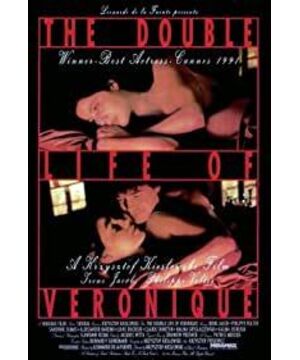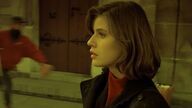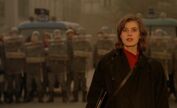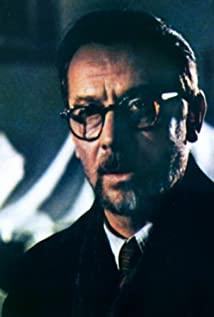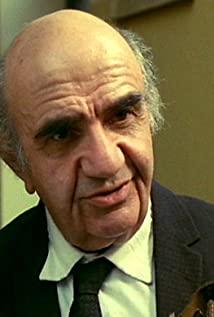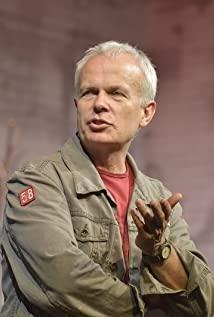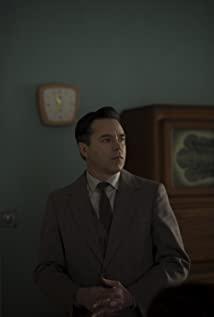No beginning and no end Animated
Untouchable Uncertainty Surprising Who am I? I've seen the trees I had young faces I've felt a gleam of sunlight through my eyes I've found the stems of leaves I've burned the blood of rats I've been arrogant or cowardly I've cried Or joy I have heard distant singing And now all this I don't know how to find Polish director Krzysztof Kieslowski's fantastic 1991 film the Double Life of Veronique creates a panoramic view of people in a world that has begun to come together In the picture of survival, he did not routinely shoot such philosophical content as rigid or even narrative, as other directors, nor did he process a film into a classical oil painting like those directors who only pursued the refinement of the film. Kieslowski sets a detailed time and place, but the place, time and people shape the film into an artistic film that may have transcendental meanings about human existence.
In the first half of the film, Weronika lives in a turbulent time in Poland, where socialist Poland begins to crumble, when Polish Weronika and French Veronique meet by chance in a Polish square, this chaotic time becomes in the shot There are many faces and shouts that people can never see, people who run and don't know where to go, crazy tanks, high-pitched singing and a temporary whiteness without any filters. This is a Poland that doesn't seem to know its way. People only have enthusiasm but no ideals, and people only have motivation but no direction. They are looking for the capitalism and freedom and democracy they want, and in this noisy background, history finally tells us that Poland is heading for a collective spiritual collapse. In these frenzied times, Weronika alone stands out. Perhaps only the Lenin image that was trucked away in the sunset was the only feeling she had of this symbolic time, and she was escaping the era symbolically by avoiding the comical puppet-like image of Lenin. When everyone else was hiding from the rain, she continued to sing and enjoy the rain, thus breaking away from the laws of mundane affairs. At the same time, the serene halo around her created by the warm orange-yellow filter is also a reflection of her tragic ending unlike others. Only Weronika is still feeling the world with her personal heart. This warm orange color represents a meticulous mind, a keen understanding of the surrounding, peace and tranquility in this chaotic time and space, but Poland at that time Why do we need such colors? It is either red for positivity and enthusiasm, or white for indifference and resistance, or black for moral rout.
Weronika's eyes were full of anticipation as she sang, as she slept, as she talked to her father and aunt about her wondrous feelings and love, and everything else that went against the nature of the heart—the parade, The demonstrations and the law filled Weronika with confusion, and those were Weronika's slightly frightened eyes. Weronika is a woman who lives in her own heart, so that when she suffered a heart attack for the first time, she ran desperately to sweep away the dead leaves, which was so beautiful that it hurts. The exhibitionist, a person who seems to be walking around in the film, represents this deformed and changing world. Weronika has no surprise, no anger, or resorting to the sanctions of the authorities. She only thinks and doubts. This deformed and changing world is in Weronika. The ugly side was shown in front of him, and he walked away quietly. Weronika couldn't understand but had no intention of falling in love, and this era and the world also moved away from Weronika in its own direction. Weronika smiled and meant destruction.
If the green light represents the coming of death, if the hunchbacked old lady represents the change of fate, then Weronika is an ancient angel in modern society, she sees the age of twilight and the coming of death, sees the confrontation of indifference, she She saw the times pass by her, but she didn't understand, she sang with all her heart, she wanted to help the dying old lady, but as described in the film, only when she died and became a real angel, she could Watching panicked people above the clouds.
This is the happy ending for Weronika. She belongs to her own nature, so in this era, she belongs to the kingdom of heaven, and she can only be an angel.
In Paris at the same time, everything was quiet, beautiful, traditional, classic, and the standard of living was very high. But the French Veronique constantly appears in cars instead of walking in the film, metaphorically speaking the state of the French Veronique living environment - spending time in the same (driving) way, in implicit compliance with a certain norm , passing in front of the speeding crowd.
If we compare the life of Weronika in Poland with this, we find that the car here has become a symbol of a kind of post-industrial society (we can say French or any post-industrial society), people's pursuit of a good quality of life (such as national The development standard of the people, the level of people's living standard is one of the car ownership) at the price of giving up the personal act of free walking. At the same time, the implicit adherence to norms brought about by this acceptance has turned the people walking on the road into rows of neatly flying shadows. The director’s arrangement here is very obvious. From the Veronique car window, people on the road can be seen. People are walking neatly, but they are just walking, keep walking, and can't see the direction clearly. And Weronika strode aimlessly on the street.
However, in this space and time where everyone seems to be acting independently of each other, Veronique's life is not entirely created by herself, her life is not self-discovered like Weronika, her life is guided.
For Weronika, singing has always been the center of her life in the film, and other factors that appeared in her life did not have a crucial impact on her. Her death was the ending she chose, her destiny. She talks passionately about sex with men and the other side of that joy is actually swept away by Kieslowski after one appearance. She felt that she was not alone in her life but even though she had seen another Veronique she was just speaking. All life changes come from her own and no other guide.
Weronika's life is as elusive as fragments. This life scattered like fragments is beautiful and cruel, because she ends in death unapproachable.
However, in contrast to Weronika's short life, Kieslowski arranged nearly two-thirds of the time to tell about Veronique's still-going life. Veronique's life is also beautiful, but this beauty is not fragmented, but coherent, dramatic, orchestrated (perhaps the most acceptable to the audience - this later) beautiful.
For Veronique, the boyfriend she met at the beginning and end may be easy to forget, but his simple cutscene sex with Veronique at the beginning hides Kieslowski's painstaking efforts. The last time Veronique and this boyfriend met was after graduating from high school, and then the two of them appeared on the bed as usual. Except for sex, without other careful attention, the boyfriend quickly left, and Veronique did not want to reveal more about her love for Weird feeling of Weronika. This made me vaguely feel that the pleasure sex that originally belonged to me was endowed with a symbolic meaning, and Veronique was trying to find symbolic encounters in an age that was increasingly disciplined and set. By chance encounter, this fateful theme is only truly understood by Weronika, but misunderstood by Veronique and becomes the "shackles" of her life.
An unexpected, surprising or sad fate has become two things in Veronique's life, constantly frivolous and superficial—symbolic and dramatic anticipation, chance and "guessing."
Maybe I can believe that in the end Veronique found the true meaning of fate, but does that boyfriend's melancholy show his hesitation towards the world?
When I exclude this boyfriend, a real bystander, I will find that all of Veronique's life is guided by other people in life, she replaces the content of life with the strategy of survival, in this sense, She deliberately or potentially devotes her life to the real non-self according to the laws of modern society, and takes this as her destiny.
Veronique felt that she was not alone in her life. Maybe she felt the real fate here, so she made a decision to give up singing training completely, but in the face of the old man "No one has the right to do that" "You are deserved to be hauled straight towards the court", she resumed the hesitant rout.
The puppet artist is a god in the world. He set up a trap to induce Veronique step by step, and made her misunderstand that it was an unknowable fate. He gave her a shoe to bring her - if the audience looks carefully, this is the shoe of Weronika in Poland belt, if we have the association that this is between two people, then we are wrong; he illuminates her with the reflection of the glass - if the audience thinks it is a romantic expression of her, then we are wrong; he gives her The tape was taped as a clue for her to look for—if the audience thought it was an expression of intelligence and subtlety, then we were wrong. There can be no God in this world, but only ourselves.
In the vast crowd of French Street, Veronique can't escape, she has no way to panic. However, in the stained glass dwelling just a few meters away from the puppet artist, she found temporary safety and a peaceful refuge. She felt that the streets and hotels were places where she could escape, and she chose and failed. Peace of mind can never be found in hotels, and the safe shore is not a worldly paradise.
Veronique began to doubt this disciplined world when she felt that God has a spirit and she was not alone. She began to search for her own meaning, but she was led astray. Puppet artist - I prefer to call him the devil, he created meaning in the world and let Veronique find it, so when Veronique found the meaning he set, he finally came to the puppet artist's side, but the puppet artist showed her Weronika , when the puppet artist made two pale Veroniques to hold their necks in their hands, and when the puppet artist wrote a story of the double life of xxx, Veronique felt the lightness and beauty. The puppet artist is just a masked demon king in the world, because the puppet artist grabbed the back of the puppet's neck while performing, and her own life is nothing but a process of meaning-seeking that has been reset. The loss of self and the misunderstanding of fate are expressed by Kieslowski in a different story.
Kieslowski sets up a story within a set, where Veronique is a set person who is as beautiful as Weronika, but different. And all the viewers who read this story are also set people, when we like the puppet artist and Veronique's romance, we also fall into the wrong direction, this is our own problem, it is Kieslowski's trap, the puppet artist's The trap, but the puppet artist did not unravel Veronique, and Kieslowski gave us a life in the continuation of the end.
Kieslowski has created a wonderful story for us. If this story is successful, then Kieslowski's attempt is a failure, and the loss of self that he worries about will never end, and the fate he wants to express will never end. It is an unattainable charm of Weronika. If this story makes us feel like a failure, then Kieslowski's attempt has succeeded. The loss of the self that he is anxious about may not be without end, and the fate he expresses will also become an attempt to internalize the observation of the audience. An attempt to re-examine the value of the times and self-worth. But the problem is that the proposition Kieslowski gave us is inherently tense in philosophy, and perfection in art adds to our pessimism about the world. Kieslowski's thesis is that as we try to internalize and discover our self-idea, we either choose the self or the world, because the world is becoming more and more superficial, and this tension is incommensurable.
Lao Ji left, and his comments on the film after the filming of "Red" made us feel the self-contradiction of the originator of this philosophical thought. Lao Ji has completed his internalization attempts again and again, but just like Weronika's ending, passing away is the best and final way to solve the problem, because the fate of the world and the fate of the individual can never be negotiated.
May Lao Ji rest forever, while the world is still suffering.
Postscript: Lao Ji may be just a child who grabs a leaf in the wind. He can't and doesn't want to tell us anything about meaning, because meaning and fate are incommensurable. He grabbed the leaf and showed it to us. We read only because we hurried past.
Huang Xiaoxie: When Lao Ji talked about this film, he said that he did not pay attention to politics,
but only concerned about people, delicate feelings, fate, mystery...
But from our point of view, he lived in the environment of that era,
he could not escape, and subconsciously he could not escape. Break free. I
remember Berdyaev's statement about the relationship between Russia and Poland: It is more difficult for peoples who are related and close to understand each other than those who are distant and unfamiliar, and they are more likely to conflict with each other. The homologous language makes an unpleasant sound, as if its own language is evil...
... It seems that the Polish nation, which is not good at the construction of state institutions and has the characteristics of individualism and anarchism, is very spiritually strong, Indestructible, no other nation in the world has such a strong national sentiment.
View more about The Double Life of Véronique reviews


